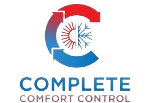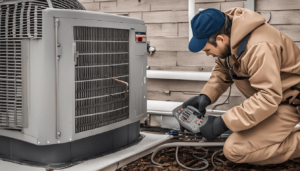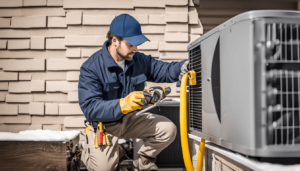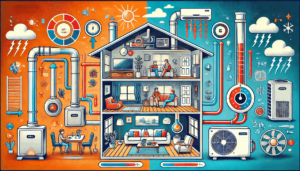1. Introduction to HVAC Systems and Their Importance
HVAC systems are the lifeblood of modern home comfort. These systems regulate temperature, air quality, and humidity, ensuring a comfortable indoor environment year-round. Whether it’s during the sweltering summer or the biting winter, the health and performance of your HVAC system are critical.
Why HVAC Systems Matter
- Indoor Comfort: A well-functioning HVAC system ensures the home remains a sanctuary regardless of outside weather conditions.
- Air Quality: Properly maintained HVAC systems help filter out dust, allergens, and pollutants.
- Energy Efficiency: Systems in good condition consume less energy, leading to reduced utility bills.
The Importance of Handling HVAC Emergencies Promptly
When your HVAC system malfunctions, acting quickly can prevent more severe issues and expensive repairs. Timely intervention ensures minimal disruption to your comfort and can avoid permanent damage to the system.
Avoiding Costly Repairs
- Small Issues Escalate: Minor issues like a clogged filter can snowball into more significant problems if left unresolved.
- Energy Drain: A malfunctioning system works harder to maintain temperature, increasing energy usage.
- Extended Damage: Ignoring emergencies could result in permanent damage to the compressor or motor.
Preserving Indoor Comfort
- Seasonal Reliability: Emergency repairs ensure your HVAC system runs efficiently during peak seasons.
- Health Considerations: Poor air quality or inadequate heating/cooling can negatively impact your health, especially for those with respiratory issues.
The DIY vs. Professional Repair Dilemma
When faced with an HVAC emergency, homeowners often struggle with the decision of attempting a DIY repair or calling a professional. While some issues can be resolved with a little troubleshooting, others require the expertise of a certified HVAC technician.
When to Consider DIY
- Simple Fixes: Resetting the thermostat, replacing air filters, or checking circuit breakers are tasks many homeowners can handle.
- Cost Savings: DIY repairs can be less expensive upfront, provided the issue is straightforward.
- Learning Opportunity: DIY can be a chance to understand your HVAC system better.
When to Call a Professional
- Complex Repairs: Issues involving electrical components, refrigerants, or motor repairs should always be handled by a licensed technician.
- Safety First: Professional repair reduces the risk of injury or further damage to the system.
- Warranties and Guarantees: Professional services often come with warranties that ensure peace of mind.
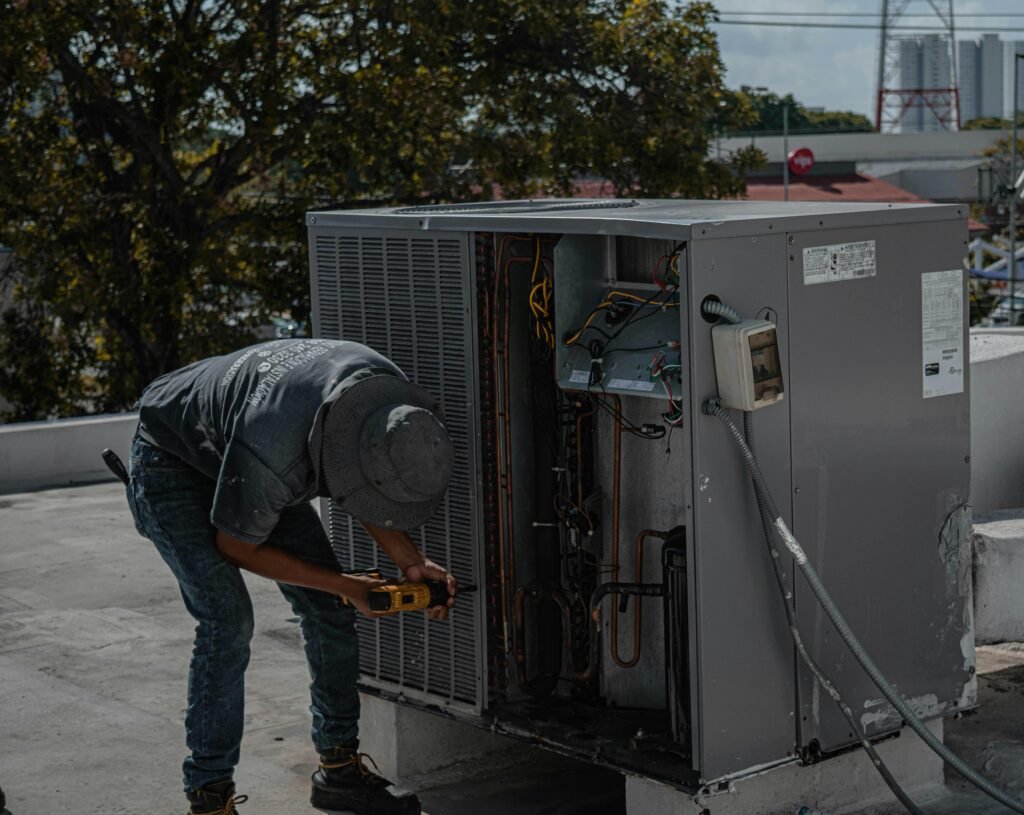
2. Understanding DIY HVAC Repairs
DIY HVAC repairs involve homeowners attempting to fix minor issues with their heating, ventilation, and air conditioning systems without professional help. While some HVAC repairs require expert knowledge, there are simple tasks homeowners can handle safely, which can help keep their system running smoothly and prevent minor issues from turning into costly repairs.
Definition of DIY HVAC Repairs
DIY HVAC repairs refer to basic troubleshooting and maintenance tasks that don’t require specialized tools, extensive training, or handling hazardous materials. These fixes are generally low-risk, and they can improve the efficiency of the system, reduce energy costs, and prevent bigger problems down the line.
Benefits of DIY HVAC Repairs
- Cost Savings: Homeowners can avoid service fees for simple issues that are easily fixable.
- Immediate Action: DIY repairs allow you to address small problems as they arise without waiting for a technician.
- System Maintenance: Regular DIY tasks can improve system longevity and performance.
Simple Fixes Homeowners Can Attempt Safely
While HVAC systems can be complex, several basic maintenance tasks and minor fixes can be handled by most homeowners. Here are some of the most common DIY HVAC repairs that are safe to attempt.
1. Replacing Air Filters
Changing air filters is one of the simplest and most effective DIY HVAC maintenance tasks. Dirty air filters reduce airflow, forcing the system to work harder and use more energy. Replacing them regularly ensures optimal system performance and improves indoor air quality.
Steps to Replace Air Filters:
- Turn off the HVAC system.
- Locate the air filter in the return air vent or the system itself.
- Remove the old filter and replace it with a new one, ensuring it’s installed in the correct direction.
- Turn the system back on.
2. Resetting the Thermostat
Sometimes HVAC issues can be resolved by simply resetting the thermostat. This may be necessary if the settings have been changed or the system isn’t responding properly. Modern programmable and smart thermostats often need a reboot to clear minor glitches.
How to Reset the Thermostat:
- Turn the thermostat off.
- Wait for a few minutes before turning it back on.
- Check the settings to ensure the correct temperature is programmed.
- If the thermostat has batteries, replace them if needed.
3. Checking Circuit Breakers
HVAC systems rely on electricity, and a tripped circuit breaker can cause the system to stop working. Checking the breaker box for tripped switches is a quick and easy DIY task to ensure the issue isn’t related to power.
Checking the Circuit Breaker:
- Go to the breaker panel and look for any switches in the “off” or tripped position.
- If the HVAC system breaker is tripped, reset it by switching it back to “on.”
- If the breaker trips repeatedly, call a professional as this could indicate a larger electrical issue.
4. Cleaning Debris Around the Outdoor Unit
The outdoor condenser unit of your HVAC system can accumulate dirt, leaves, and other debris, which restricts airflow and reduces efficiency. Regular cleaning of the unit helps prevent overheating and keeps the system functioning optimally.
Steps to Clean the Outdoor Unit:
- Turn off the power to the unit.
- Remove any visible debris like leaves, grass, or dirt from the outside.
- Use a hose to gently wash off dirt from the condenser coils.
- Trim any overgrown vegetation around the unit to allow for proper airflow.

3. When to Call a Professional for HVAC Repairs
While some HVAC issues can be handled by homeowners, more complex or dangerous problems require the expertise of a professional. Attempting to fix serious HVAC issues without the proper knowledge and tools can lead to further damage or even personal injury. Knowing when to call a professional ensures your HVAC system remains safe, efficient, and functional.
Complex or Dangerous Issues That Require Expert Handling
Certain HVAC problems involve electrical components, refrigerants, or complex mechanical parts that need specialized knowledge to fix. These are not only complicated but also pose significant safety risks. Here are some situations where calling a professional is essential:
1. Electrical Problems
HVAC systems rely heavily on electrical components, including wiring, capacitors, and circuits. Electrical malfunctions can lead to system failures, or worse, electrical fires. Handling electrical issues without proper training is dangerous and can result in electrocution or fire hazards.
Signs of Electrical Problems:
- System not turning on or shutting off unexpectedly.
- Blown fuses or tripped circuit breakers.
- Burning smells or sparks around the HVAC unit.
A professional HVAC technician can safely diagnose and repair electrical issues, ensuring your system runs safely and efficiently.
2. Refrigerant Leaks
Refrigerants are chemical compounds used in cooling systems to absorb heat and cool the air inside your home. Leaks in the refrigerant line reduce the system’s efficiency and can harm the environment. Additionally, refrigerant exposure is dangerous to human health and requires specific handling procedures.
Signs of a Refrigerant Leak:
- Poor cooling performance.
- Hissing or bubbling sounds near the outdoor unit.
- Ice forming on the evaporator coils or refrigerant lines.
Only certified technicians can legally handle and replace refrigerants. Attempting to fix a refrigerant leak on your own can cause further damage to the system and pose health risks.
3. Motor or Compressor Issues
The motor and compressor are crucial components that keep the HVAC system running. The motor powers the fans, while the compressor circulates the refrigerant. Problems with these parts can lead to total system failure and costly repairs if not addressed immediately.
Signs of Motor or Compressor Issues:
- HVAC system fails to start or struggles to maintain the set temperature.
- Unusual clicking or humming sounds from the outdoor unit.
- Frequent system cycling on and off.
Motor and compressor repairs are complicated and require specific tools and training. Attempting to repair these components without professional expertise can result in further damage and expensive replacements.
4. Persistent Airflow Problems
Airflow issues can stem from various causes, including blocked ducts, malfunctioning blowers, or faulty fans. When airflow problems persist after changing filters and clearing debris, it could indicate a more serious underlying issue.
Symptoms of Persistent Airflow Problems:
- Weak or inconsistent airflow from vents.
- Hot and cold spots in different areas of the house.
- System running continuously without achieving the desired temperature.
A professional can diagnose the root cause of airflow issues and provide appropriate solutions to restore balanced airflow throughout your home.
5. Unusual Noises or Odors from the System
Strange noises or unpleasant smells coming from your HVAC system are often signs of serious mechanical or electrical issues. Ignoring these warning signs can lead to system breakdowns or even safety hazards like carbon monoxide leaks.
Common Warning Sounds and Odors:
- Grinding, banging, or screeching noises (often indicate motor or fan problems).
- Burning smells (possible electrical issue or overheating).
- Musty or moldy odors (indicating mold growth inside the system).
Professionals have the experience to quickly identify the source of unusual noises or odors and resolve the issue before it worsens.
Safety Concerns: Avoiding Injury and Further Damage
One of the biggest reasons to call a professional for HVAC repairs is safety. HVAC systems contain electrical wiring, moving parts, and refrigerants, all of which pose serious safety risks if not handled properly. Attempting repairs without the necessary skills can result in:
1. Electrical Shocks or Fire Hazards
- Handling live wires or faulty electrical components without the proper precautions can cause severe injury or fire.
2. Refrigerant Exposure
- Refrigerants can be harmful if inhaled or if they come in contact with the skin. Leaks require proper containment and disposal procedures.
3. Further System Damage
- Incorrectly diagnosing or fixing a problem can cause further damage, leading to even more expensive repairs or full system replacements.
4. Voiding Warranties
- Many HVAC systems come with manufacturer warranties that may be voided if repairs are done by someone who is not a licensed professional.
5. Health and Comfort Risks
- Improperly repaired HVAC systems can impact indoor air quality, comfort, and even health, especially if there are issues like carbon monoxide leaks or mold growth.

4. The Risks of DIY HVAC Repairs
While attempting to fix HVAC issues yourself may seem like a cost-effective solution, it comes with several risks. Complex repairs require specialized knowledge, tools, and training. Taking on tasks beyond your expertise can lead to serious consequences that outweigh any potential savings. In this section, we’ll explore the risks associated with DIY HVAC repairs and why it’s often better to call a professional.
Potential Dangers of Attempting Complicated Repairs
Complex HVAC systems consist of intricate electrical components, refrigerants, motors, and more. Attempting to repair these parts without the necessary skills or tools can cause significant harm to both the system and yourself.
1. Voiding Warranties
Most HVAC systems come with manufacturer warranties that cover repairs and parts replacements for a specified period. However, attempting DIY repairs on the system can void these warranties, leaving you responsible for all future repair costs.
How Warranties Are Voided:
- Performing unauthorized repairs or modifications.
- Using non-approved parts or materials.
- Failing to have repairs done by a licensed HVAC professional.
Warranties often require that certified technicians perform all repairs and maintenance, so DIY efforts could nullify this protection, resulting in costly out-of-pocket expenses for future issues.
2. Misdiagnosis Leading to More Damage
One of the most significant risks of DIY HVAC repairs is misdiagnosing the problem. HVAC systems are complex, and a minor issue might seem easily fixable, but underlying causes can remain undetected. Attempting the wrong repair can exacerbate the issue and lead to further damage.
Examples of Misdiagnosis:
- Replacing a fuse when the issue is a faulty circuit board.
- Cleaning the condenser when the real problem is a refrigerant leak.
- Adjusting the thermostat settings when the issue is a compressor failure.
This trial-and-error approach can not only fail to resolve the problem but also make it worse, resulting in more extensive (and expensive) repairs down the line.
3. Electrical Hazards
HVAC systems rely heavily on electrical components to operate, and mishandling them poses serious risks. Electrical problems are among the most dangerous issues to attempt as a DIY repair, as they can lead to severe injury or damage.
Electrical Hazards in HVAC Repairs:
- Risk of electrocution when working with live wires or circuits.
- Potential for electrical fires if wiring is not handled correctly.
- Improper installation of parts can cause short circuits or overloads.
Professionals are trained to safely handle electrical components and identify issues without risking injury or damaging the system. Without this expertise, DIY repairs involving electrical components are highly dangerous.
4. Health Risks from Refrigerants and Gases
Refrigerants are essential for cooling your home, but they are also hazardous chemicals that must be handled with care. If your HVAC system has a refrigerant leak, trying to fix it yourself can expose you to harmful gases, leading to health risks and environmental damage.
Dangers of Refrigerant Leaks:
- Exposure to refrigerants can cause skin irritation, dizziness, nausea, or even respiratory issues.
- Releasing refrigerants into the atmosphere contributes to environmental harm, as they are powerful greenhouse gases.
Additionally, federal regulations prohibit the handling of refrigerants by individuals who are not licensed. Licensed professionals have the proper certification to handle and dispose of refrigerants safely.
5. Financial Risks: How Improper Repairs Can Lead to Higher Future Costs
While DIY repairs might seem like a good way to save money initially, improper repairs can lead to significant future costs. Misdiagnosis, improper parts, or incomplete fixes can all contribute to larger, more expensive problems down the road.
Examples of Financial Risks:
- More Frequent Repairs: A temporary fix may result in the same problem recurring, requiring repeated professional intervention.
- System Replacement Costs: Serious damage caused by improper repairs can necessitate the replacement of expensive components, such as the compressor, or even the entire HVAC system.
- Reduced Energy Efficiency: Incorrect repairs can cause the system to operate inefficiently, increasing your energy bills and reducing the system’s lifespan.
By attempting to save money on repairs now, you may face significantly higher costs in the future, not to mention the potential for complete system failure.
5. Benefits of Hiring a Professional for HVAC Repairs
When it comes to HVAC repairs, hiring a professional offers several advantages that go beyond just fixing the problem. Professionals bring the necessary expertise, tools, and guarantees that ensure your system runs smoothly and efficiently. Below are some key benefits of opting for professional HVAC services over attempting DIY repairs.
1. Expertise and Proper Diagnosis
Certified HVAC technicians have the training and experience to accurately diagnose issues with your heating and cooling system. They can quickly pinpoint the root cause of a malfunction, which is crucial in preventing further damage and unnecessary costs.
How Expertise Helps:
- Accurate Problem Identification: Professionals can differentiate between symptoms and the actual problem, ensuring the issue is resolved correctly the first time.
- Knowledge of Various Systems: Whether you have a central air system, heat pump, or ductless unit, HVAC professionals are familiar with a wide range of systems and their components.
- Compliance with Industry Standards: Technicians follow HVAC industry regulations and safety protocols, ensuring repairs are done according to manufacturer guidelines and local codes.
Hiring a professional reduces the risk of misdiagnosing the problem, saving time and preventing expensive future repairs.
2. Availability of Specialized Tools and Equipment
Professional HVAC technicians have access to specialized tools and equipment that most homeowners do not. These tools allow them to perform repairs more accurately and efficiently, particularly for complex issues that cannot be addressed with basic home repair tools.
Benefits of Specialized Tools:
- Precision in Repairs: Tools such as vacuum pumps, refrigerant recovery machines, and leak detectors ensure that repairs are done with a high degree of precision.
- Safety: Certain tools, like refrigerant handling equipment, are necessary to safely manage hazardous substances. Without these tools, handling refrigerants or working on electrical components can be dangerous.
- Efficiency: Technicians can complete repairs faster and more effectively because they have the right tools for the job, minimizing system downtime and disruption to your comfort.
Attempting to fix HVAC issues without proper tools can result in further damage, making professional service the safer, more effective choice.
3. Guaranteed Service Quality and Warranties
One of the most significant advantages of hiring a professional is the guarantee of service quality. Most HVAC companies provide warranties on their work, ensuring peace of mind for homeowners.
Benefits of Guaranteed Service:
- Warranty on Labor and Parts: Most HVAC professionals offer warranties that cover parts and labor for a certain period after the repair. If the issue recurs during this time, they will fix it at no additional cost.
- Certified Technicians: Professionals are often licensed, bonded, and insured, giving you added confidence that the work will be done right.
- Peace of Mind: With a professional’s guarantee, you won’t have to worry about paying for repairs twice if something goes wrong soon after the first repair.
Warranties and service guarantees also protect your investment, helping to extend the lifespan of your HVAC system and avoid future repair costs.
4. Faster and Efficient Resolution During Emergencies
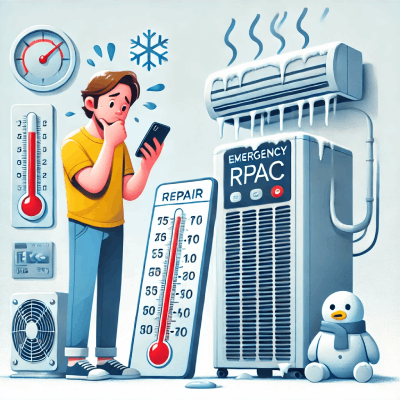
During an HVAC emergency, time is of the essence. A broken furnace in the winter or a malfunctioning air conditioner in the summer can make your home uncomfortable or even unsafe. Professional technicians are equipped to handle emergencies quickly and efficiently, restoring your system to working condition with minimal delay.
Why Professionals Offer Faster Resolutions:
- Rapid Response: Many HVAC companies offer 24/7 emergency services, ensuring that help is available when you need it most.
- Experience with Emergency Situations: Professionals are trained to work under pressure and can quickly assess and repair issues in critical situations.
- Minimizing Downtime: With their expertise and tools, professionals can often complete repairs in a fraction of the time it would take a homeowner to troubleshoot and attempt DIY fixes.
In emergency situations, relying on a professional ensures that your HVAC system is back up and running as quickly as possible, minimizing discomfort and potential damage.
6. When DIY Can Save You Money
While professional HVAC services are essential for complex repairs and emergencies, there are several simple maintenance tasks and minor fixes that homeowners can perform themselves to keep their systems running smoothly. Taking care of these basic issues can save you money in the long run by preventing larger problems, reducing energy consumption, and extending the life of your HVAC system.
Simple Maintenance Tips and Repairs to Keep HVAC Systems Running Smoothly
Regular upkeep can significantly enhance your HVAC system’s performance and efficiency, while also preventing the need for costly repairs down the road. Here are some simple maintenance tasks and repairs that homeowners can handle on their own.
1. Regularly Replacing Filters
One of the most straightforward and effective ways to maintain your HVAC system is by regularly replacing the air filters. Dirty filters restrict airflow, making the system work harder and reducing its efficiency. Replacing filters every 1 to 3 months can improve air quality, boost system efficiency, and extend the life of your HVAC components.
Benefits of Replacing Air Filters Regularly:
- Improved indoor air quality.
- Reduced strain on the system, leading to lower energy bills.
- Prevents dust buildup on HVAC components, minimizing future repairs.
2. Keeping Vents Clean and Unobstructed
Blocked or dirty vents can reduce airflow, causing your HVAC system to overwork and potentially overheat. Regularly cleaning vents and ensuring they’re not obstructed by furniture or other objects will improve air circulation throughout your home, helping your system run more efficiently.
Steps for Cleaning Vents:
- Use a vacuum or soft brush to remove dust and debris from the vent covers.
- Make sure all vents are open and free from obstructions like furniture or curtains.
- Check ducts for visible blockages and clean if necessary.
3. Checking Thermostat Settings
Incorrect thermostat settings can cause your HVAC system to work harder than necessary, wasting energy and increasing costs. Regularly checking and adjusting your thermostat can help ensure that your system is running efficiently.
Thermostat Maintenance Tips:
- Ensure the thermostat is set to the appropriate temperature for the season.
- For programmable thermostats, review the schedule to ensure it matches your lifestyle (e.g., adjusting temperature when you’re not home).
- Consider upgrading to a smart thermostat, which can learn your preferences and optimize energy use.
4. Basic Troubleshooting for Minor Issues
Not all HVAC problems require a professional. Some minor issues, like the system not turning on or not blowing cold air, can be fixed with simple troubleshooting steps. Before calling a professional, check the following:
Basic Troubleshooting Steps:
- System Won’t Turn On: Check the circuit breaker, reset the thermostat, or replace the batteries.
- No Cold Air: Make sure the thermostat is set to “cool” mode and the temperature is set correctly. Check for any clogged filters or debris around the outdoor unit.
- Unusual Noises: Tighten any loose parts like screws on the air handler or blower cover.
These simple troubleshooting steps can save you the cost of a service call if the issue is minor.
Cost Comparison: DIY vs. Professional Repair for Common Issues
For some common HVAC issues, the cost difference between DIY and professional repair can be significant. Here’s a comparison of what homeowners can expect to save by handling basic maintenance and repairs themselves.
Replacing Air Filters
- DIY Cost: $10-$30 per filter.
- Professional Cost: $75-$150 for a service visit and filter replacement.
Cleaning Vents
- DIY Cost: $0 (with household cleaning tools).
- Professional Cost: $100-$300 for duct and vent cleaning services.
Thermostat Troubleshooting
- DIY Cost: $0 (adjusting settings) or $50-$200 (installing a new thermostat).
- Professional Cost: $150-$500 for thermostat replacement, depending on the type.
Basic Troubleshooting
- DIY Cost: $0 (checking breaker, thermostat settings, or resetting system).
- Professional Cost: $75-$200 for a basic service call, even for minor fixes.
By performing these simple tasks yourself, you can save hundreds of dollars annually, especially if you consistently replace filters, clean vents, and keep an eye on basic system functions. However, always remember that attempting complex repairs without professional expertise can lead to more damage and higher costs in the future.
How to Choose the Right HVAC Professional
Finding a reliable HVAC technician is crucial for maintaining, repairing, or installing your heating and cooling system. With so many options available, it’s essential to select a professional who is trustworthy, skilled, and able to meet your specific needs. Below are key tips on how to choose the right HVAC professional for your home or business.
1. Look for Certifications and Licenses
One of the most important factors to consider when choosing an HVAC professional is their certifications and licenses. These credentials demonstrate that the technician has undergone the necessary training and adheres to industry standards.
What to Look For:
- NATE Certification (North American Technician Excellence): NATE-certified technicians have passed rigorous tests proving their technical expertise and competence in handling HVAC systems.
- EPA Certification (Environmental Protection Agency): HVAC professionals working with refrigerants must be EPA-certified to handle these substances legally and safely.
- Local Licenses: Many states and local municipalities require HVAC contractors to be licensed. Always check for proper licensing before hiring a technician, as this ensures they comply with local regulations and building codes.
Hiring a certified and licensed professional guarantees that your HVAC system will be handled with care, and that the work will meet legal and safety standards.
2. Read Reviews and Ask for Referrals
A reliable HVAC technician should have a solid reputation backed by satisfied customers. Reading online reviews and asking for referrals from friends, family, or neighbors can give you a sense of the quality of service provided by a particular company.
How to Evaluate Reviews:
- Look for Consistency: Focus on companies with consistently high ratings over a large number of reviews. This indicates dependable service.
- Pay Attention to Specific Feedback: Reviews that mention punctuality, professionalism, and successful repair outcomes are positive indicators.
- Check Multiple Platforms: Look for reviews on different platforms, such as Google, Yelp, and the Better Business Bureau (BBB), to get a well-rounded view of customer experiences.
Asking for Referrals:
- Reach out to people you know who have recently had HVAC work done and ask about their experience with the technician or company.
- A referral from someone you trust can give you peace of mind and help you avoid unreliable contractors.
By checking reviews and getting referrals, you can feel confident that the HVAC professional you hire will be reliable and deliver high-quality service.
3. Request Quotes and Compare Service Guarantees
Before deciding on an HVAC professional, it’s a good idea to get multiple quotes from different companies. Comparing estimates allows you to weigh your options and make an informed decision about which service is the best value.
What to Include in Quotes:
- Breakdown of Costs: Request a detailed breakdown of the costs, including parts, labor, and any potential additional fees. This transparency can help you avoid hidden costs or surprise charges later on.
- Service Guarantees: Check whether the technician offers guarantees or warranties on their work. Service guarantees protect you in case the problem recurs or if parts fail soon after the repair.
Things to Consider:
- Don’t automatically go for the lowest quote. Instead, balance cost with the quality of service, expertise, and reviews.
- Look for companies that stand behind their work with clear service guarantees, such as warranties on parts and labor, to ensure long-term reliability.
Comparing quotes and guarantees will help you select a professional who offers a fair price without compromising on service quality.
4. Emergency Services: The Importance of 24/7 Availability
HVAC emergencies can happen at any time, and being able to rely on a technician who offers 24/7 emergency services is critical. Whether it’s a malfunctioning furnace in the middle of winter or a broken air conditioner during a heatwave, timely repairs are essential to maintain comfort and safety.
Why 24/7 Availability Matters:
- Immediate Response in Critical Situations: Systems often fail during extreme weather, and delays in repairs can be uncomfortable or even dangerous. An HVAC professional who offers emergency services can respond quickly to get your system back up and running.
- Reduced Downtime: The faster a technician can respond to your emergency, the less time your system will be out of commission, minimizing disruptions to your daily life.
- Peace of Mind: Knowing that help is available around the clock gives you peace of mind, especially during peak seasons when systems are under more strain.
How to Confirm Emergency Services:
- Check whether the HVAC company offers 24/7 emergency services, and ask how quickly they typically respond to urgent calls.
- Make sure that their emergency contact information is easy to access in case you need to reach them after business hours.
Hiring a technician who provides emergency services ensures that you’re covered in case of unexpected system failures, keeping your home comfortable at all times.
Conclusion
Choosing the right HVAC professional involves more than just comparing prices. Look for technicians with the proper certifications and licenses, check reviews and ask for referrals to verify their reputation, and compare quotes and service guarantees to ensure you’re getting the best value. Additionally, prioritizing a company that offers 24/7 emergency services will give you peace of mind, knowing help is available when you need it most. By taking these steps, you can hire a reliable HVAC professional who will keep your system running smoothly for years to come.
Resources:
American Lung Association – Indoor Air Quality and the Role of HVAC Systems
https://www.lung.org/
Energy Star – Guide to Energy-Efficient Heating and Cooling
https://www.energystar.gov/
ASHRAE – Basics of HVAC Systems and Maintenance Standards
https://www.ashrae.org/
Natural Resources Canada – Heating and Cooling with a Heat Pump
https://www.nrcan.gc.ca/
Ontario.ca – Energy Efficiency Programs and Tips for Ontario Homes
https://www.ontario.ca/
Government of Canada – Home Heating and Cooling Systems Overview
https://www.canada.ca/
HVAC.com – Comprehensive Guide to HVAC Systems and Repair Needs
https://www.hvac.com/
Carrier – How HVAC Systems Work and Maintenance Essentials
https://www.carrier.com/
Trane – Selecting the Right HVAC System for Your Home
https://www.trane.com/
U.S. Department of Energy – Thermostat Settings and Energy-Saving Tips
https://www.energy.gov/
North American Technician Excellence (NATE) – Certification information and industry standards for HVAC technicians. www.natex.org
U.S. Environmental Protection Agency (EPA) – Certification guidelines for technicians working with refrigerants and environmental safety in HVAC work. www.epa.gov
Energy Star – Provides insights on HVAC maintenance, efficiency tips, and the benefits of professional HVAC services. www.energystar.gov
HVAC School – A comprehensive HVAC education resource offering articles on HVAC equipment, tools, and troubleshooting for professionals. www.hvacrschool.com
Angi (formerly Angie’s List) – Consumer advice on hiring contractors and evaluating service quality, including reviews and tips for hiring HVAC professionals. www.angi.com
American Society of Heating, Refrigerating, and Air-Conditioning Engineers (ASHRAE) – Industry standards, safety protocols, and guidelines for HVAC professionals. www.ashrae.org
Better Business Bureau (BBB) – Reviews and ratings of HVAC companies to help consumers select reputable professionals. www.bbb.org
HomeAdvisor – Cost comparisons and hiring tips for professional HVAC services, including emergency service providers. www.homeadvisor.com
